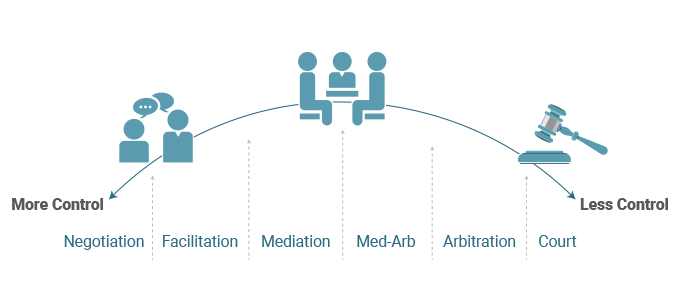
Before learning about Mediation specifically, it’s helpful to know why it’s different from other methods of resolving conflict. Mediation is one tool in a spectrum of different options, each with its own pros and cons. We’ve listed each according to how much control they give to participants, from most control to least.
The classic one-on-one form of conflict resolution. A negotiation can be any kind of discussion aimed at reaching an agreement without the help of impartial judges, mediators, or facilitators. For many people, this is the ideal starting place for resolving conflicts; but, for various reasons, it can often spiral into a hostile showdown.
A facilitator is a person whose role is to help create a productive conversation. Often the goal is to achieve better understanding, spark creativity, and to unite people’s diverse perspectives, rather than resolve a specific conflict. Facilitation is often used for strategic planning, team building, and brainstorming.
A mediator is someone who facilitates a conversation between two or more people to help them resolve a conflict or a dispute. Mediators are impartial and will not make decisions for you. They are trained to establish and maintain a safe, confidential, communicative process, and to help participants reach an agreement. There may be specific regulations as to who can do this work.
This hybrid process, short for Mediation-Arbitration combines the benefits of mediation (where the parties control the outcome) and arbitration (where the med-arbitrator makes the final decision on any remaining issues). The Med-Arb process ensures participants will get a resolution.
The arbitrator makes a binding decision regarding the issue(s) in a dispute. Like a judge, they hear evidence and make decisions based on those. Unlike going to court, arbitration can be scheduled a lot quicker and the arbitrator is usually chosen by both participants. There may be specific regulations as to who can do this work.
Decisions are made through the judicial system by judges. This process is the least private, the most expensive, and the most time-consuming. In certain conflicts, depending on the people involved and the issues at hand, it can also be the only process that works.
A conflict coach works with you one-on-one to help you deal with conflict more effectively. This can happen alone or in combination with another process like mediation or negotiation.
A conflict coach can help you clarify your situation, develop strategies for handling the conflict, prepare you for challenging conversations and increase your competence and confidence.
Lawyers can help you understand your rights and responsibilities, and the options that are available to you under the law. Getting legal advice can be an important step toward being able to engage in any conflict resolution process effectively. Aside from just calling a lawyer near you, there are plenty of ways to get legal advice in BC. People’s Law School has a list of available services, including low-cost or free ones.
Mediate BC serves communities across the lands of many Indigenous peoples, unceded, unsurrendered, and treaty. We are committed to advancing Indigenous sovereignty, inherent rights and self-determination. In order to do this, we commit to deepening our understanding of the histories and cultures of Indigenous peoples and the ongoing effects of colonization. Further, we commit to developing meaningful dialogue and relationships founded on respect.
Notifications